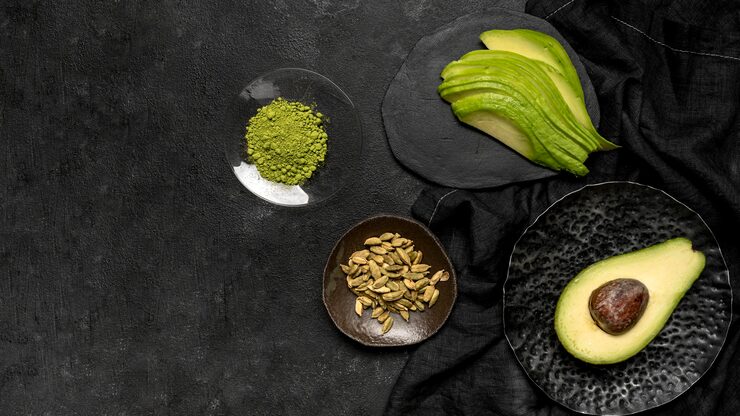Should you use refined or unrefined avocado oil? You might think “unrefined” is always better—less processing, more nutrients. That’s often true, but with avocado oil it’s not that simple. Unrefined oil does keep more nutrients, but refined oil has its own advantages. Which is best depends on how you plan to use it.
Avocado oil isn’t just for cooking—it’s popular in skincare and haircare too. Many people try products with avocado oil on their skin before they ever cook with it. When using it in food, though, there are a few things to keep in mind.

How is avocado oil made?
There are two main ways to extract avocado oil:
– Cold-pressed (unrefined): The oil is mechanically pressed at controlled, low temperatures (usually below 50°C / 122°F) with no chemicals. This keeps the oil’s natural flavor, color, vitamins, and antioxidants.
– Heat extraction (often used for refined oil): Higher temperatures and sometimes chemicals are used to increase yield. This can reduce nutrients and change the flavor.
Like olive oil?
Avocado oil and olive oil are similar in that they can be cold-pressed or refined and are rich in healthy fats (mainly monounsaturated fats like oleic acid). The main difference is that olive oil comes from olives, while avocado oil is pressed from the fruit’s flesh. Avocado oil tends to be creamier and has a higher smoke point than most olive oils, which makes it better for higher-heat cooking.
What happens during refining?
Refined avocado oil goes through extra steps to make it mild and stable:
– Degumming: Removes gummy substances to clarify the oil.
– Neutralization: Uses a base to remove free fatty acids, lowering acidity.
– Bleaching: Filters the oil through clay to remove pigments, lightening the color.
– Deodorizing: Steams the oil at high heat to remove strong odors and flavors.
– Winterization (optional): Chills the oil so waxes and solid fats can be filtered out for clarity when refrigerated.
These steps make the oil more neutral in taste and longer lasting, but they also remove some nutrients and flavor.
Nutrient comparison
Refining boosts versatility for cooking but reduces many of the oil’s natural nutrients and antioxidants. Generally:
– Vitamins: Unrefined oil is rich in vitamins A, D, and E; refined oil has far less.
– Antioxidants: Unrefined contains lutein, beta-carotene, and polyphenols; refining removes most of these.
– Fatty acids: Both keep monounsaturated fats (oleic acid), though minor compounds may be lost in refining.
– Phytosterols: Present in unrefined oil (mainly β-sitosterol); reduced after refining.
– Chlorophylls and carotenoids: Give unrefined oil its green color and antioxidant power; mostly removed during refining.
Specific values vary by processing and avocado quality. Bottom line: if you want the most nutrients and antioxidants, choose unrefined. If you just want healthy fats and a neutral taste, refined is fine.
Labels: what do they mean?
Label terms aren’t strictly regulated, so they don’t always tell the full story.
– Regular avocado oil: Not a standard term, but often means refined—neutral flavor and higher smoke point.
– Pure avocado oil: Can mean 100% avocado oil, but not necessarily unrefined. Many “pure” oils are refined.
– Extra virgin avocado oil: Least processed, from the first pressing without heat or chemicals. It keeps flavor, color, and nutrients and is great for dressings, drizzling, and low-heat uses.
Be careful: some products labeled “extra virgin” or “pure” are adulterated or rancid. A UC Davis study found many avocado oil samples were rancid or mixed with other oils. To avoid this, choose reputable brands that explain their sourcing and processing.
Which should you use?
It depends on the use—cooking, skincare, and shelf life all matter.
Quick guide:
– High-heat cooking (frying, roasting): Both work. Unrefined smoke point ≈ 250°C / 482°F; refined ≈ 271°C / 520°F. Refined is best if you want a totally neutral flavor.
– Salads, dressings, drizzling: Unrefined is best for flavor and nutrients.
– Baking: Either works—refined is neutral, unrefined adds a light avocado note.
– Skincare and haircare: Unrefined is better for hydration and nutrients; refined can be gentler for sensitive skin.
– Supplements and pet care: Unrefined offers more beneficial compounds.
Other notes
Unrefined oil may go rancid faster because of its higher nutrient content. Refining extends shelf life. If you want supplements or the most skin benefits, pick unrefined.
Conclusion
There’s no single “better” oil—choose based on what you need. Use refined avocado oil for very high-heat cooking or when you want a neutral taste. Use unrefined avocado oil when you want maximum nutrients, a richer flavor, or the best skin and hair benefits. Now you can pick the right avocado oil for your needs.